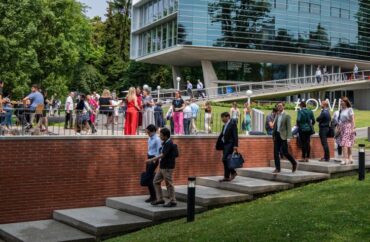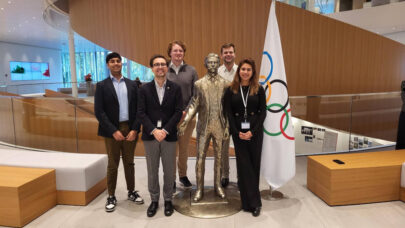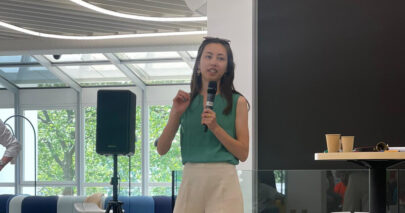Artificial Intelligence (AI) is affecting every aspect of our lives, from how we build our homes, grow our food, how we get medical advice to our relationships. In her keynote speech, Ayesha Khanna, co-founder and CEO of Addo, sets the scene about how the future will look like as AI transforms the way we live, work and interact with others. A future that is already here.
Khanna delivered the keynote address “Leading transformations with artificial intelligence” at IMD’s Orchestrating Winning Performance program in Singapore. She took participants on a journey, showcasing the potential that AI offers, and the impact AI is making as it penetrates more aspects of our lives.
Future cities made of natural materials and innovative spaces
“When we think of future cities, we think of Wakanda, where there are amazing buildings and it is very science fiction and made from all these interesting materials, but actually the future city doesn’t look very exciting. It is more important that future cities are sustainable,” Khanna explained.
“In Japan, work is already under way to construct a 70-storey building made out of 90% wood. This is the reality because futuristic thinking and climate friendly thinking are needed when developing the cities of the future to ensure sustainability. Cities of the future will move away from concrete heavy buildings; more and more buildings will be built of sustainable materials like treated wood.”
Increasingly living spaces will become more fluid and multi-purpose.
“Buildings will no longer be dumb cement only. They are going to be alive. Laced with AI that is going to constantly change, be multifunctional and dynamic.”
The “cities of the future” already exist, said Khanna. For example, there is Tengah district in Singapore and Neom in Saudi Arabia. These areas are notably greener and there are fewer cars, and they show that smart cities are the way of the future, where any space can be used and be multifunctional.
“If you are not committed to sustainability and you are not using infrastructure in a smart way, you are going to lose both as a country, as a company and your customers will walk away,” said Khanna.
Precision farming in unexpected places
By 2050, it is expected that 10 billion people will live in cities and 80% of all food will be consumed in cities. Bringing farming closer to the city will be increasingly critical and this is already happening in the world’s biggest urban centers. Farming in the city significantly reduces supply chain transport costs.
“You can find sustainable urban farming in unexpected places, for example, in London farming is taking place in an old World War II refugee tunnel.” The former war tunnel, thirty-three meters below London’s Clapham High Street, is an urban farm, and an example of the brilliance of precision farming.
“The farm is already 12 times more productive than a regular farm,” Khanna explains. It uses AI and a network of onsite cameras to ensure optimum growing condition, resulting in bumper harvests. By precisely controlling the environment 70% less water is used, and the farming is pesticide free.”
Colleagues and friends of the future
“Our colleagues will be AI and it’s going to change the way we work,” said Khanna. “If you don’t have an AI colleague, you are going to be in trouble.”
Khanna, whose company Addo builds AI assistants for telecommunications companies, logistics companies, governments and healthcare companies, also shared the story of
how three entrepreneurs used AI to shake up the Chilean mayonnaise market (the 3rd largest market for mayonnaise in the world). Khanna explained how the start-up NotCo’s founders set about making a plant-based mayonnaise.
“They hired Giuseppe, the AI chef, and became a best-selling mayonnaise supplier in Chili.”
Giuseppe is an algorithm that has a database of more than 400,000 plants. He analyses the animal-based product at a structural level and then gives a variety of formulas that could be replicated in the laboratory and at speed.
“This could not have happened without Giuseppe because no human laboratory technician or chef could go through that many recipes at such high speed, and not only is it more efficient, it only gets more efficient with time,” Khanna explained. “The ability of the company to use AI to develop a range of products attracted the attention of Kraft Heinz who partnered with NotCo because of their patented AI technology.”
She says that thinking about how to use AI to accelerate and enrich your products and services is critical:
“AI is there to amplify human potential.”
By speeding up processes, AI allows humans to be more creative, thoughtful, and strategic and leaves the less interesting, but time-consuming tasks to AI.
Giuseppe is not the only AI colleague making an impact. AI companions are also filling the gap for people who are lonely and who just want a friend. Replika, is a personal chatbot powered by AI, which offers companionship for people seeking a friend ‘with no judgement, drama or social anxiety.’ Eight million people in the US have downloaded it and millions elsewhere. “Young people are talking to Replika a lot,” says Khanna.
Interacting in a physical and virtual world
“Don’t focus on the technology, focus on the human behaviour,” said Khanna.
To understand the relevance of the metaverse just consider that there are 3.21 billion gamers in the world who are interacting online and in a virtual world every day.
“A metaverse is any place where people get together in another altered reality,” she explains. “Half the world’s population go in and out of digital and physical spaces comfortably, trading in game coins, buying skins, candy, farmlands using non-government issued currency.”
“Don’t think about the technology, think about the underlying tsunami of people that are spending more time in metaverse-like behaviors … Already in places like Korea government officials such as a local mayor is engaging with citizens in the metaverse, as it is a country where people are very comfortable with gaming and operating in the metaverse.”
But with great power comes great responsibility
Wrapping up the session, Khanna reminded participants that while AI offers tremendous opportunity, there is a “dark side”.
She explained that currently one per cent of global electricity is used to power data centres. This will only increase as we produce and consume more data every day as over 50 billion connected drives are coming online. “Ensuring that these data centres are as sustainable as possible is critical. Already innovation is coming out that will address this concern.”
It is also important to always ask the question “where is the all the data going?”.
“The problem is not the AI, it is who owns the AI and what are they doing with it? If it is a good company in a well-regulated industry, then it should be fine. If not, citizens need to say stop.” She cited the example of a Canadian city who put stop to the development of a smart city when citizens realized that the data would be stored across the border.
“Privacy, sustainability, and ethics will make everything that I say possible, and more innovation will come out of it. If that doesn’t happen, then companies will suffer from loss of trust. You have no choice but to use AI because your competitor will otherwise leave you in the dust.”
“That is the exciting and scary future,” concluded Khanna.




